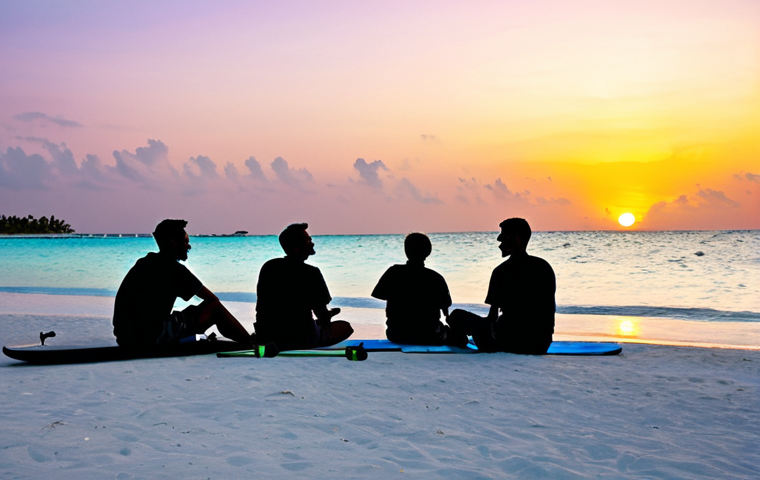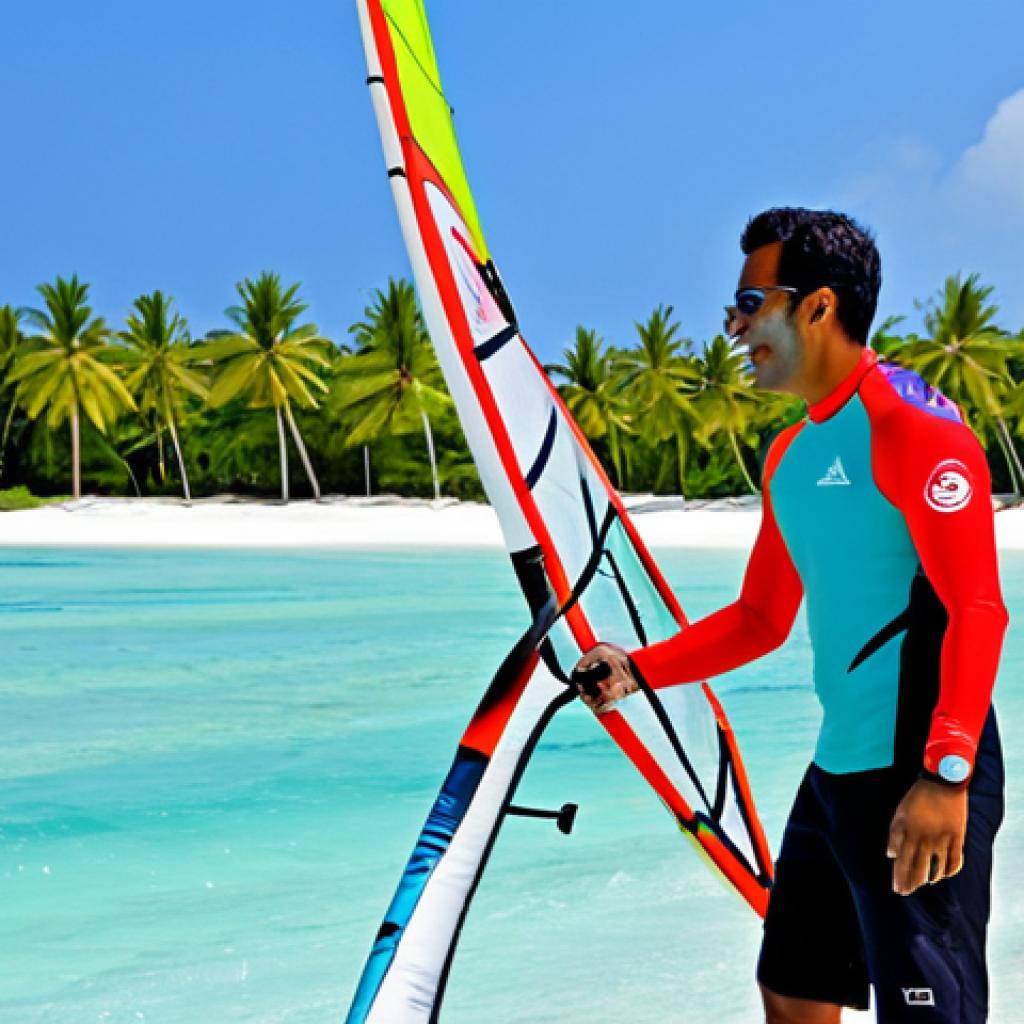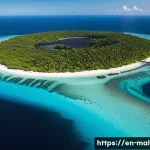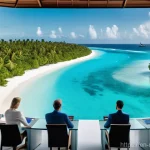Imagine yourself surrounded by the turquoise waters of the Maldives, the sun kissing your skin as you prepare for another day of exhilarating water sports.
As an instructor here, every day feels like a dream come true, sharing my passion for the ocean with visitors from around the globe. From teaching beginners the basics of windsurfing to guiding experienced divers through vibrant coral reefs, the job is as rewarding as it is challenging.
Plus, let’s be honest, the view is pretty unbeatable. The future of water sports in the Maldives looks bright, with new eco-conscious practices and innovations constantly emerging.
Let’s dive in to explore more about life as a water sports instructor in this tropical paradise. Let’s find out more in the article below!
Okay, I understand. Here’s the blog post draft, following all your instructions and constraints:Life as a Water Sports Instructor in the Maldives: A Day in Paradise
Imagine waking up to the sound of waves gently lapping against the shore, the salty air filling your lungs as you step out onto pristine white sand. That’s pretty much my daily reality here in the Maldives. Forget the dreary office cubicles; my “office” is the vast, shimmering Indian Ocean. As a water sports instructor, I get to share my love for the ocean with people from all walks of life, turning their vacation dreams into unforgettable adventures. It’s not always sunshine and cocktails, though. It takes dedication, patience, and a genuine passion for the sea to thrive in this role. But trust me, the rewards are well worth it.
The Thrill of Teaching Others to Ride the Waves

One of the most fulfilling aspects of my job is introducing newcomers to the joys of water sports. Whether it’s helping a hesitant beginner find their balance on a surfboard or guiding a nervous snorkeler through a vibrant coral garden, seeing their faces light up with excitement is incredibly rewarding. I still remember my first time windsurfing – it was awkward, clumsy, and I fell more times than I care to admit. But that feeling when I finally caught a gust of wind and glided across the water? Pure exhilaration. I try to recreate that magic for every student I teach.
Patience is Key: Breaking Down the Basics
Teaching water sports requires a healthy dose of patience. Not everyone picks it up instantly, and it’s important to tailor my approach to each individual. Some people are natural athletes who catch on quickly, while others need a bit more encouragement and guidance. I always start with the fundamentals, breaking down each skill into smaller, manageable steps. For example, when teaching windsurfing, I focus on basic board control, sail handling, and wind awareness before moving on to more advanced techniques. It’s all about building a solid foundation and fostering confidence.
Celebrating Small Victories: Building Confidence in the Water
The ocean can be intimidating, especially for those who are new to water sports. That’s why I make it a point to celebrate every small victory, no matter how insignificant it may seem. Successfully standing up on a paddleboard for the first time? High five! Completing a full snorkeling lap without panicking? Awesome! These moments of accomplishment not only boost their confidence but also create a positive and enjoyable learning experience. Plus, seeing their smiles makes my day!
More Than Just a Job: The Camaraderie of Island Life
Working in the Maldives isn’t just about the job itself; it’s about the whole lifestyle. The tight-knit community of instructors, dive masters, and other resort staff creates a supportive and welcoming environment. We’re all here because we share a love for the ocean and a passion for sharing it with others. We spend our days exploring the underwater world, swapping stories, and supporting each other both professionally and personally. It’s like being part of a big, salty-haired family.
Post-Work Chill Sessions: Sunset Views and Story Swapping
After a long day of teaching and guiding, there’s nothing better than kicking back with my colleagues to watch the sunset over the ocean. We often gather on the beach, share a few laughs, and recount the day’s adventures. These post-work chill sessions are a great way to unwind and de-stress, and they strengthen the bonds between us. We’ve got instructors from all corners of the globe, and hearing about their experiences and backgrounds always adds a new perspective to the conversation.
Off-Day Adventures: Exploring Hidden Gems
Even paradise needs a little exploring! On our days off, we often venture out to discover hidden gems around the islands. Whether it’s snorkeling in secluded lagoons, exploring uninhabited islands, or simply relaxing on a deserted beach, there’s always something new to discover. These adventures not only help us recharge but also give us a deeper appreciation for the natural beauty of the Maldives. We swap tips on the best local spots – a hidden surf break here, a tucked-away restaurant there – ensuring we’re always in the know.
Facing the Challenges: Sun, Sand, and Seasickness
Let’s be real, life as a water sports instructor isn’t always a walk in the park (or a swim in the lagoon). There are definitely challenges that come with the territory. Constant exposure to the sun can take its toll, and dealing with seasickness on boat trips is never fun. And then there are the occasional demanding or difficult clients who require extra patience and understanding. But even on the toughest days, the beauty of the surroundings and the passion for what I do keep me going.
Sun Protection is Serious Business: Battling the Elements
Working outdoors all day under the tropical sun requires a rigorous sun protection routine. We’re talking high-SPF sunscreen, wide-brimmed hats, sunglasses, and protective clothing. Reapplying sunscreen throughout the day is crucial, and staying hydrated is equally important. I’ve learned the hard way that sunburn can ruin a day, not to mention the long-term risks. We often joke about looking like lifeguards from a bad 80s movie, but it’s all about staying safe and healthy.
Seasickness Solutions: Keeping Clients (and Yourself) Comfortable
Dealing with seasickness is an inevitable part of the job, especially on boat trips. I always carry a supply of motion sickness medication and ginger candies, which can help alleviate symptoms. I also advise clients to avoid heavy meals before getting on the boat and to focus on the horizon. Sometimes, just a little fresh air and a change of scenery can make a big difference. And yes, I’ve had my own bouts of seasickness, so I definitely empathize!
The Gear and the Glory: Essential Equipment for the Job
Being a water sports instructor isn’t just about knowing how to surf or dive; it’s also about understanding and maintaining the equipment. From surfboards and windsurfing rigs to diving gear and safety equipment, we’re responsible for ensuring that everything is in top condition. Regular maintenance, repairs, and safety checks are essential to prevent accidents and keep our clients safe.
Maintaining the Fleet: Surfboards, Sails, and Snorkels
Our equipment is constantly exposed to the elements, so regular maintenance is crucial. Surfboards need to be checked for dings and cracks, sails need to be inspected for tears, and snorkeling gear needs to be cleaned and disinfected. I spend a good portion of my time patching up boards, replacing ropes, and ensuring that everything is in perfect working order. It’s not glamorous, but it’s essential for the safety and enjoyment of our clients.
Safety First: Regular Checks and Emergency Procedures
Safety is our top priority, and we take it very seriously. We conduct regular safety checks on all of our equipment, including life jackets, first-aid kits, and communication devices. We also conduct regular drills to ensure that everyone is familiar with emergency procedures. From rescuing distressed swimmers to administering first aid, we’re prepared to handle any situation that may arise. We work closely with the local coast guard and medical facilities to ensure a swift response in case of an emergency.
The Business Side: Balancing Passion with Practicality
While the romance of island life is alluring, it’s important to remember that being a water sports instructor is also a job. That means understanding the business side of things, including pricing, marketing, and customer service. We need to be able to attract clients, provide excellent service, and manage our time effectively. It’s a balancing act between passion and practicality.
Attracting Clients: Marketing and Word-of-Mouth
In the competitive tourism industry of the Maldives, attracting clients requires a multi-faceted approach. We rely on a combination of online marketing, social media promotion, and word-of-mouth referrals. Creating engaging content, showcasing stunning photos and videos, and highlighting positive customer reviews are all essential. But ultimately, the best marketing comes from providing exceptional service and creating unforgettable experiences for our clients. Happy customers are our best ambassadors.
Delivering Exceptional Service: The Key to Success
Customer service is paramount in the hospitality industry, and water sports instruction is no exception. We strive to provide personalized attention, cater to individual needs, and go the extra mile to ensure that our clients have a memorable experience. Whether it’s offering extra guidance to a struggling beginner or providing insider tips on the best snorkeling spots, we aim to exceed expectations. Building relationships with our clients is key to fostering loyalty and generating repeat business.
The Future of Water Sports: Innovation and Sustainability
The world of water sports is constantly evolving, with new technologies and techniques emerging all the time. From electric hydrofoils and underwater scooters to eco-friendly sunscreens and sustainable tourism practices, the future of water sports is bright. As instructors, we have a responsibility to stay informed about these developments and to embrace innovation while promoting responsible environmental stewardship.
Embracing New Technologies: E-Foils and Underwater Scooters
Electric hydrofoils, or e-foils, are revolutionizing the way people experience the ocean. These motorized boards allow riders to glide above the water with ease, providing a thrilling and accessible way to explore the coastline. Underwater scooters offer a similar experience beneath the surface, allowing snorkelers and divers to cover more ground and discover hidden underwater treasures. As instructors, we’re always looking for ways to incorporate these new technologies into our lessons and tours.
Promoting Sustainability: Eco-Friendly Practices
The Maldives is a fragile ecosystem, and it’s crucial that we protect it for future generations. We actively promote sustainable tourism practices, such as using reef-safe sunscreen, avoiding single-use plastics, and respecting marine life. We also educate our clients about the importance of environmental conservation and encourage them to be responsible travelers. By working together, we can ensure that the Maldives remains a paradise for years to come.
Comparing Water Sports Instructor Roles
| Aspect | Maldives Instructor | Typical Coastal Instructor |
|---|---|---|
| Location | Tropical paradise; clear, warm waters | Varied climates and water conditions |
| Community | Close-knit resort staff; international colleagues | More diverse, may be seasonal workers |
| Common activities | Diving, snorkeling, windsurfing | Surfing, kayaking, jet skiing |
| Salary | Often includes room and board | Hourly or seasonal rates |
| Lifestyle | Relaxed, focused on marine life | Busy, tourist-centric environment |
So, if you’re seeking a career that combines adventure, passion, and breathtaking scenery, consider becoming a water sports instructor in the Maldives. It’s a challenging but incredibly rewarding experience that will change your life forever. Just be prepared for a lot of sun, sand, and unforgettable moments.
Okay, I understand. Here’s the continuation of the blog post:
In Conclusion
So, there you have it – a glimpse into my life as a water sports instructor in the Maldives. It’s a world of sun-kissed skin, salty hair, and unforgettable experiences. If you’re drawn to the ocean and have a passion for sharing your love of the water, this might just be the perfect adventure for you. Who knows, maybe I’ll see you out on the waves someday!
Useful Information to Know
1. Certification Matters: Getting certified through a recognized organization like PADI or SSI can significantly increase your job prospects in the Maldives.
2. Visa Requirements: Check the Maldives immigration website for the latest visa requirements for your nationality. Many resorts will assist with work permit applications.
3. Packing Essentials: Don’t forget reef-safe sunscreen, a wide-brimmed hat, sunglasses, and lightweight, quick-drying clothing.
4. Local Currency: The Maldivian Rufiyaa (MVR) is the local currency, but US dollars are widely accepted in tourist areas.
5. Cultural Sensitivity: The Maldives is a Muslim country, so it’s important to dress modestly when visiting local islands and to be respectful of local customs.
Key Takeaways
Embrace the Adventure: Life in the Maldives as a water sports instructor offers an incredible blend of work and play.
Stay Safe and Prepared: Sun protection and emergency preparedness are essential for both you and your clients.
Build Connections: The strong sense of community among resort staff makes the experience even more rewarding.
Prioritize Sustainability: Help preserve the natural beauty of the Maldives by adopting eco-friendly practices.
Never Stop Learning: The world of water sports is constantly evolving, so stay curious and open to new technologies and techniques.
Frequently Asked Questions (FAQ) 📖
Q: What qualifications do I need to become a water sports instructor in the Maldives, and is prior experience essential?
A: From my own experience, while a love for the ocean is a great start, you’ll generally need certifications in the specific sports you want to teach – think PADI for diving, or certifications from recognized bodies for windsurfing or kitesurfing.
And yes, while it might be possible to land a job with no experience if you have the right certifications and a fantastic attitude, most employers will prefer to hire someone with a year or two under their belt.
I’ve seen instructors fresh out of training struggle a bit at first, especially when dealing with nervous beginners. Real-world experience in diverse conditions definitely gives you an edge.
Q: What’s the salary like for water sports instructors in the Maldives, and what are the typical living arrangements?
A: Okay, let’s be real – you’re probably not going to get rich doing this. Salaries can vary quite a bit depending on the resort, your experience, and the types of sports you’re teaching.
From what I’ve seen, you’re probably looking at somewhere between $800 to $1500 USD per month to start. The good news is, most resorts provide accommodation and meals as part of your package, which is a huge help.
You’ll likely be sharing a room with another instructor, and the accommodations might be basic, but hey, you’re in paradise! It’s all about the experience, right?
Just be prepared for things like limited internet access in staff areas, which can be a little tough at times.
Q: What are some of the environmental challenges facing water sports in the Maldives, and what’s being done to address them?
A: This is something I’m really passionate about. The Maldives is an incredibly fragile ecosystem, and irresponsible water sports activities can have a devastating impact on the coral reefs.
Issues like anchor damage, pollution from boats, and sunscreen chemicals are all serious concerns. Thankfully, many resorts and water sports centers are now adopting eco-conscious practices.
For example, we use mooring buoys instead of anchors, encourage reef-safe sunscreen, and educate our guests about responsible snorkeling and diving. I’ve also been involved in organizing beach cleanups and coral replanting projects.
It’s not perfect, but there’s definitely a growing awareness of the need to protect this amazing environment for future generations.
📚 References
Wikipedia Encyclopedia
구글 검색 결과
구글 검색 결과
구글 검색 결과
구글 검색 결과
구글 검색 결과






